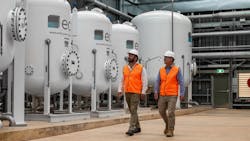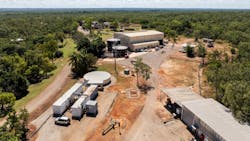Introduction
The historical use of aqueous film forming foam (AFFF) at RAAF Base Tindal in Northern Territory (NT) led to significant per- and polyfluoroalkyl substances (PFAS) contamination of the Tindal aquifer. This contamination threatened the safety of the drinking water supply for the Katherine community, which relies on both surface water from the Katherine River and groundwater to meet peak demand. With approximately 10,000 people dependent on this water source, an immediate and long-term treatment solution was crucial. ECT2, renowned for its expertise in PFAS remediation, stepped in to secure safe drinking water for the Katherine community.
Opportunity and Challenge
In 2017, detection of PFAS in the water supply necessitated a swift and effective response. The Australian Department of Defence, recognising the urgency, partnered with ECT2 and the Power and Water Corporation to design, fabricate, transport, install, and commission an interim treatment system. The system needed to be operational within four months, a significant challenge given the complex logistics and remote location of Katherine.
Interim Solution
ECT2’s interim treatment system, designed to supply 1 megalitre per day (ML/d) or 10% of Katherine’s daily water demands, was a pivotal initial step. This system included pre-treatment filtration to remove solids and co-contaminants, followed by PFAS removal using ECT2’s proprietary SORBIX™ ion exchange (IEX) resins. The system was manufactured in Maine and transported in shipping containers for rapid deployment. Remarkably, the system was air-freighted to Darwin and then transported 330 kilometres to Katherine, going online in late October 2017. By March 2024, it had treated over 2.3 billion litres of water.
Long-term Solution
To address long-term water supply needs, ECT2 designed a full-scale treatment system capable of processing 10 ML/d, sufficient to meet the entire town’s demand during surface water supply interruptions. This system, also based on pre-treatment filtration and SORBIX™ IEX resins, included three independent streams each capable of processing 5 ML/d. This design provided redundancy, allowing maintenance without disrupting water supply. The plant’s ability to regenerate the resin significantly reduced waste and ensured compliance with stringent Australian Drinking Water Guidelines.
Project Execution and Impact
The full-scale plant, commissioned in November 2023, passed a three-month performance test and met all operational criteria, leading to the decommissioning of the interim plant in March 2024. The successful implementation of this project earned the Katherine PFAS Water Treatment Remediation Project the Australasian Land and Groundwater Association Industry Excellence Award for the Best Remedial Project >$1M in November 2019.
Expert Insights
Darrin Stoker, ECT2’s Business Development Manager in Australia, highlighted the pervasive nature of PFAS, present in everyday materials and firefighting foams, and its persistence in the environment. He emphasised the project's unique nature in Australia due to the plant's scale and rapid construction to safeguard the community.
Steve Woodard, Ph.D., P.E., ECT2’s Co-Founder and Chief Innovation Officer, described the groundwater contamination from firefighting foam and that ECT2’s focused approach on scope, schedule, and budget offered the most efficient solution for the project. He noted the selection of technology that could be rapidly deployed and re-energized to minimise waste.
Liam Early, Senior Project Manager at Power and Water Corporation, stressed the urgency due to Katherine’s reliance on contaminated groundwater and the need to lift water restrictions by providing a second water source.
Andy Bishop, P.E., ECT2’s Co-Founder and Senior Vice President of Product Commercialisation, mentioned the dual treatment systems at the RAAF base and Katherine’s water supply. He highlighted ECT2’s existing engagement in Australian projects and the flexibility and rapid deployment of their equipment as key reasons for their selection.
Carl Sueli, ECT2’s General Manager in Australia, attributed their selection of ECT2 to the company’s reputation, reliability, and technical prowess. He expressed pride in being part of a team that consistently delivers on what they say they will do.
Conclusion
ECT2’s rapid and effective response to PFAS contamination at the water treatment plant ensured the Katherine community’s access to safe drinking water. The successful deployment of both interim and full-scale treatment systems demonstrated ECT2’s technical excellence and commitment to public health. This project not only secured water safety for Katherine but also set a benchmark for PFAS remediation efforts globally.
To learn more about our innovative PFAS remediation solutions and how we can help secure safe water supplies, visit ECT2’s PFAS Solutions or watch the videos on our Katherine project by clicking here.


